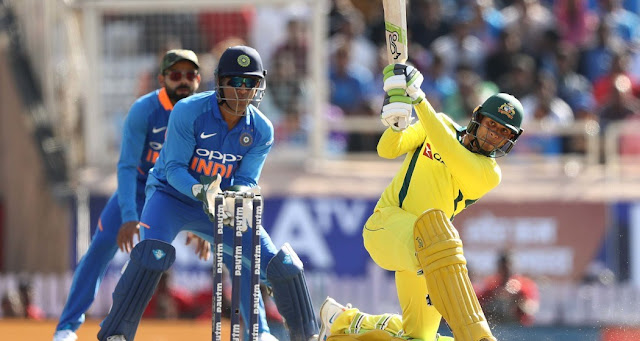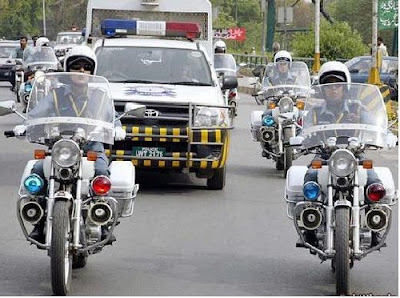Army Caps and India's ODI Series Defeat by Australia
When the Indian national cricket team took to the field for its third ODI against Australia in Ranchi on March 8, 2019, they wore military caps to show support for the Indian military against Pakistan. This was an unprecedented act of politicization of international sports on Prime Minister Narendra Modi's watch in India. Pakistan born Usman T. Khawaja, Australia's opening batsman, responded to it with a maiden century that helped his team win by 32 runs after losing first two ODIs. Khawaja then proceeded to score the series highest total score of 383 to help Australia win the remaining two ODIs and the series 3-2.
Usman Tariq Khawaja:
Usman Tariq Khawaja, born in Islamabad, Pakistan, is the first Muslim member of the Australian national cricket team. He currently represents Australia and Queensland. Khawaja made his first-class cricket debut for New South Wales in 2008 and played his first international match for Australia in January 2011.
Pakistan born Usman T. Khawaja, Australia's opening batsman, responded to Indian team's jingoism with a maiden century that helped his team win the 3rd of 5 ODIs by 32 runs after losing first two ODIs. Khawaja then proceeded to score the series highest total score of 383 to help Australia win the remaining the remaining two ODIs and the series 3-2. Khawaja was named player of the match for 3rd and 5th ODIs.
India's Sports Jingoism:
In an Op Ed for Huffpost, Indian journalist Binoo John summed up what happened in Ranchi in the following words: "No team in the history of modern cricket has worn military camouflage caps or symbols during an international match to make a statement".
What happened in Ranchi is part of a pattern of Modi-led Indian hostile actions that include an almost total boycott of all cultural and sports exchanges that have historically helped lower tensions between the two South Asian neighbors. Pakistani artists are no welcome in India's entertainment industry. Pakistan players are banned from Indian cricket leagues.
Politicization of Culture and Sports:
Modi government has completely ignored Indian parliament's foreign affairs committee report that recommended: “Taking a holistic picture, the committee are of the considered opinion that cultural, sporting and humanitarian exchanges need to be approached from a broader perspective as this could emerge as one potential area of creating peace constituencies in both the countries.”
In February 2019, the International Olympic Committee decided to suspend all Indian applications to host future events and urged international sports federations not to stage competitions in the country after two Pakistanis were denied visas to compete in New Delhi.
Hindu Nationalism:
Hindu Nationalists, led by RSS Karsevak Modi and aided by the jingoistic Indian media, are radicalizing India's population by promoting hatred against minorities. Attacking Pakistan fits in well with the Hindu Nationalist Islamophobic narrative. Madhav Golwalkar, considered the founder of the Hindu Nationalist movement in India, saw Islam and Muslims as enemies. He said: “Ever since that evil day, when Moslems first landed in Hindusthan, right up to the present moment, the Hindu Nation has been gallantly fighting to shake off the despoilers".
In his book "We" (1939), Madhav Sadashiv Golwalkar, the leader of the Hindu Nationalist RSS wrote, "To keep up the purity of the Race and its culture, Germany shocked the world by her purging the country of the Semitic races -- the Jews. Race pride at its highest has been manifested here. Germany has also shown how well-nigh impossible it is for races and cultures, having differences going to the root, to be assimilated into one united whole, a good lesson for us in Hindusthan to learn and profit by."
Indian Think Tanks:
Hindu Nationalists are aided by what Indian journalist Pankaj Mishra calls "New Delhi’s burgeoning military-intellectual complex is exacerbating rather than moderating the country’s warlike mood". Mishra is referring to India's large and rapidly growing think tank industry with many "armchair generals..marching India into trouble". Here's the relevant excerpt of Mishra's Bloomberg Op Ed about India's think tanks:
"Perched in privately funded think tanks, many of these connoisseurs of “surgical strikes” did not seem in the least shocked or disturbed that an Indian leader who has, as the Economist put it last week, “made a career of playing with fire” was now playing with Armageddon by launching airstrikes into Pakistan. Rather, they echoed the Hindu nationalist consensus that India was now finally dictating the terms of engagement with its rival — a triumphalism shattered the very next day when Pakistan raised its own threshold for conflict with India by striking within Indian territory and bringing down an Indian warplane. Eisenhower’s fear in 1961 of vested interests acquiring “unwarranted influence” is freshly pertinent in today’s New Delhi. With hopes rising that India would soon be a superpower closely allied to the U.S., as well as a strategic counterweight to China, much Indian and foreign money has gone into creating a luxurious ecosystem for strategic experts and foreign-policy analysts".
Here's an Australian 60 Minutes video about Islamabad Australian cricketer Usman Khawaja:
https://youtu.be/OdkY30QGPFE
Related Links:
Haq's Musings
South Asia Investor Review
Cutting Sports Ties in South Asia
Balakot and Kashmir: Fact Checkers Expose Indian Lies
Is Pakistan Ready for War with India?
Pakistan-Made Airplanes Lead Nation's Defense Exports
Modi's Blunders and Delusions
India's Israel Envy: What If Modi Attacks Pakistan?
Project Azm: Pakistan to Develop 5th Generation Fighter Jet
Pakistan Navy Modernization
Pakistan's Sea-Based Second Strike Capability
Bollywood Eyes Pakistan Market Amid Declining Revenues
 |
| Pakistan Born Usman Khawaja Batting for Australia Against India at Ranchi |
Usman Tariq Khawaja, born in Islamabad, Pakistan, is the first Muslim member of the Australian national cricket team. He currently represents Australia and Queensland. Khawaja made his first-class cricket debut for New South Wales in 2008 and played his first international match for Australia in January 2011.
Pakistan born Usman T. Khawaja, Australia's opening batsman, responded to Indian team's jingoism with a maiden century that helped his team win the 3rd of 5 ODIs by 32 runs after losing first two ODIs. Khawaja then proceeded to score the series highest total score of 383 to help Australia win the remaining the remaining two ODIs and the series 3-2. Khawaja was named player of the match for 3rd and 5th ODIs.
India's Sports Jingoism:
In an Op Ed for Huffpost, Indian journalist Binoo John summed up what happened in Ranchi in the following words: "No team in the history of modern cricket has worn military camouflage caps or symbols during an international match to make a statement".
What happened in Ranchi is part of a pattern of Modi-led Indian hostile actions that include an almost total boycott of all cultural and sports exchanges that have historically helped lower tensions between the two South Asian neighbors. Pakistani artists are no welcome in India's entertainment industry. Pakistan players are banned from Indian cricket leagues.
Politicization of Culture and Sports:
Modi government has completely ignored Indian parliament's foreign affairs committee report that recommended: “Taking a holistic picture, the committee are of the considered opinion that cultural, sporting and humanitarian exchanges need to be approached from a broader perspective as this could emerge as one potential area of creating peace constituencies in both the countries.”
In February 2019, the International Olympic Committee decided to suspend all Indian applications to host future events and urged international sports federations not to stage competitions in the country after two Pakistanis were denied visas to compete in New Delhi.
Hindu Nationalism:
Hindu Nationalists, led by RSS Karsevak Modi and aided by the jingoistic Indian media, are radicalizing India's population by promoting hatred against minorities. Attacking Pakistan fits in well with the Hindu Nationalist Islamophobic narrative. Madhav Golwalkar, considered the founder of the Hindu Nationalist movement in India, saw Islam and Muslims as enemies. He said: “Ever since that evil day, when Moslems first landed in Hindusthan, right up to the present moment, the Hindu Nation has been gallantly fighting to shake off the despoilers".
In his book "We" (1939), Madhav Sadashiv Golwalkar, the leader of the Hindu Nationalist RSS wrote, "To keep up the purity of the Race and its culture, Germany shocked the world by her purging the country of the Semitic races -- the Jews. Race pride at its highest has been manifested here. Germany has also shown how well-nigh impossible it is for races and cultures, having differences going to the root, to be assimilated into one united whole, a good lesson for us in Hindusthan to learn and profit by."
Indian Think Tanks:
Hindu Nationalists are aided by what Indian journalist Pankaj Mishra calls "New Delhi’s burgeoning military-intellectual complex is exacerbating rather than moderating the country’s warlike mood". Mishra is referring to India's large and rapidly growing think tank industry with many "armchair generals..marching India into trouble". Here's the relevant excerpt of Mishra's Bloomberg Op Ed about India's think tanks:
"Perched in privately funded think tanks, many of these connoisseurs of “surgical strikes” did not seem in the least shocked or disturbed that an Indian leader who has, as the Economist put it last week, “made a career of playing with fire” was now playing with Armageddon by launching airstrikes into Pakistan. Rather, they echoed the Hindu nationalist consensus that India was now finally dictating the terms of engagement with its rival — a triumphalism shattered the very next day when Pakistan raised its own threshold for conflict with India by striking within Indian territory and bringing down an Indian warplane. Eisenhower’s fear in 1961 of vested interests acquiring “unwarranted influence” is freshly pertinent in today’s New Delhi. With hopes rising that India would soon be a superpower closely allied to the U.S., as well as a strategic counterweight to China, much Indian and foreign money has gone into creating a luxurious ecosystem for strategic experts and foreign-policy analysts".
Here's an Australian 60 Minutes video about Islamabad Australian cricketer Usman Khawaja:
https://youtu.be/OdkY30QGPFE
Related Links:
Haq's Musings
South Asia Investor Review
Cutting Sports Ties in South Asia
Balakot and Kashmir: Fact Checkers Expose Indian Lies
Is Pakistan Ready for War with India?
Pakistan-Made Airplanes Lead Nation's Defense Exports
Modi's Blunders and Delusions
India's Israel Envy: What If Modi Attacks Pakistan?
Project Azm: Pakistan to Develop 5th Generation Fighter Jet
Pakistan Navy Modernization
Pakistan's Sea-Based Second Strike Capability
Bollywood Eyes Pakistan Market Amid Declining Revenues



Comments
https://timesofindia.indiatimes.com/sports/more-sports/wrestling/world-wrestling-body-takes-away-junior-asian-championship-from-india/articleshow/68452419.cms
Over the last two years, Pakistan has made serious strides towards bringing big cricket back to the country in a significant way. The PCB has successfully hosted various international teams over the last 20 months as well as the high-profile PSL. All this, according to the ICC's chief executive officer David Richardson, has "changed the perception" of Pakistan as a place to visit.
International cricket in Pakistan came to an abrupt halt with the 2009 terror attack on Sri Lanka's team bus in Lahore, with Pakistan's national team finding a home away from home in the UAE. Since the visit of Zimbabwe in 2015, however, there has been a slow and steadily increasing flow of teams touring Pakistan.
"I think they've done a tremendous job and the level of comfort is growing all the time among the foreign players," Richardson said, during Sunday's PSL final between Quetta Gladiators and Peshawar Zalmi in Karachi. "I know some security officials from Australia and other countries have come to see the matches here. Step by step, certainly, Pakistan is on the right path and I know that the PCB will be redoubling their efforts to encourage people and teams to come across and certainly it will be with the ICC's support."
#IOC bans international #sports in #India. World #wrestling body takes away junior #Asian championship from #India after #India's visa refusal to #Pakistani wrestlers.The fate of Davis Cup tie between India and Pakistan is also uncertain. http://toi.in/jrqUFb/a24gk via @TOISports
This disproportionate state response matters because it can come with costs, both social and economic. Observers can see the former because misused internet shutdowns can affect individuals’ ability to express even unpopular opinions freely—a right enshrined in the 1948 Universal Declaration of Human Rights and reaffirmed in a 2012 Human Rights Council declaration, which extended protections to both offline and online spaces.
Consider how, in September 2012, after a viral video began to anger Muslims in the Kashmir Valley, the regional government of Jammu and Kashmir ordered telecommunications companies to restrict access to YouTube and Facebook there. But the telecom operators chose to overcomply, and they disrupted access to the entire internet, rather than to specific websites. While done for the sake of security—protests erupted as the video circulated—it isn’t a stretch to see how this overly broad latitude could be used to censor any opinion perceived as unpopular.
As for the economic cost, a recent study on shutdowns in India—conducted by the think tank ICRIER—finds that, from 2012 through 2017, 16,315 shutdown hours cost the country’s economy approximately $3.04 billion. This is hardly ideal for a country that yearns to cement its place as a major power on the international stage.
On top of that, a shutdown goes directly against the government’s Digital India initiative, which attempts to promote a cashless economy. This is because a cornerstone of the e-commerce industry is access to open and reliable internet. (Notably, an Indian ride-hailing operator, Ola Cabs, has created an “offline” variation of its app for areas that experience intermittent internet connectivity.)
https://www.theguardian.com/film/2023/feb/03/bollywood-pakistan-muslims-narendra-modi-india
Try as the industry might, Modi’s quasi-fascist politics cannot be set to jaunty music and helicopter stunts
Pathaan’s plot is nonsensical, and no one wears many clothes as they dance in bikinis and shorts trying to save India and therefore the world. It is naturally unconcerned with facts – article 370 was the instrument that allowed Kashmir’s ascension into the Indian union; if it is declared null and void, then so too is Kashmir’s ascension to India, but why bother with facts or what any actual Kashmiris think or feel? There aren’t any in this insipid film anyway.
I interviewed Khan, or SRK, as he is known to his hundreds of million fans around the world, for a book five years ago and noticed even then that he straddles an uncomfortable role as the ever grateful Muslim who is really, really, really Indian. As India embraces the Hindu majoritarian politics of its ruling BJP party, high-profile Muslim figures like Khan are increasingly seen as fifth columnists. Trolls and angry protesters often beseech Muslim stars to “go back to Pakistan”, though they have no roots there. Today in India, anyone who questions the government or dissents from popular discourse is slandered as “anti-national” and told to go live in Pakistan.
---------------
If recent Bollywood films are any indication, it is fair to say that India’s film industry is obsessed with Pakistan. Obsessed. Like standing outside your apartment and trying to peek through your windows at night with binoculars obsessed.
If the films were smarter or more daring, Pakistan might be flattered. Instead, we are beginning to be mildly confused by all the attention.
Even though our common neighbour China has taken – without too much of a struggle and aided by a helpful press blackout in India – 38,000 sq km of Indian land in Ladakh, on which they are building homes and bridges, you won’t find any Bollywood films with Chinese villains or bad guys.
No, all the nasties in Indian cinema are Pakistanis, usually wearing military uniforms, and always Muslim.
Bollywood has always reflected Indian political trends; the films of the 1950s mirrored the optimism and romance of the newly independent country, the 1970s hero was a proud but disenfranchised man fighting against the powerful and corrupt. In the 1990s, there were endless films about neo-liberal yuppies who worked in Dubai, danced in London discos and drove shiny Mercedes. Since Narendra Modi and his rightwing party, the Bharatiya Janata Party or BJP, came to power nearly nine years ago, Bollywood has readily embraced his menacing politics.
In 2018, the starlet Alia Bhatt headlined Raazi, a film about a woman who marries a Pakistani army officer in order to spy on the country during the 1971 war with India. In 2019, Bollywood released Uri, a military flick about Indian special forces launching a “surgical strike” on Pakistan after a supposed terror attack. Though Uri was based on a real incident that nearly brought two nuclear-armed states to war, it played fast and loose with the facts.
All this is especially unpleasant as Pakistanis have traditionally been enthusiastic audiences for Bollywood – the industry brought us songs and fun and the profound knowledge that our neighbours look and live just like us, demonstrating the incredible power of culture done right.